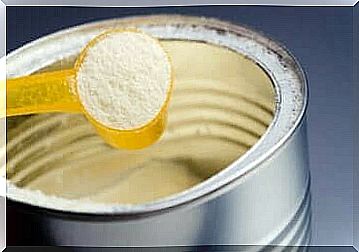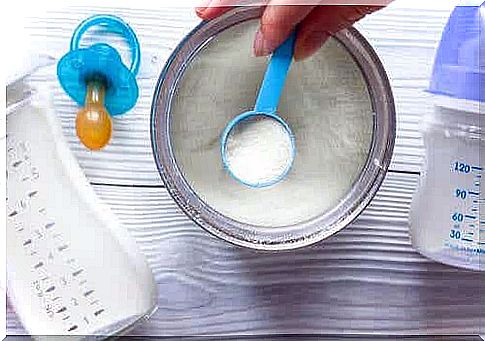Studies Show That Bottle Feeding Is High In Sugar

Many people use formula as a substitute for breast milk and as a supplement to the nutrition of the little ones. However, recent studies suggest that the amount of sugar contained in formula is excessively high. This can have negative consequences for the development of the baby.
One of these consequences could be a change in the microflora, which is very sensitive to nutrition in the early stages of life, as this study has examined. Too much sugar in formula can make the baby more prone to developing obesity, diabetes and other complex diseases.
Bottle feeding and breast milk
Ideally, bottle feeding should be developed in such a way that it resembles breast milk as closely as possible in terms of nutritional value. This ensures that babies can develop properly and that the body works properly.
However, it may be a good idea to include slightly higher levels of certain nutrients such as omega-3 fatty acids in the recipe. According to some studies, these fatty acids are beneficial for brain development. And they have very beneficial anti-inflammatory properties.
Bottled food that contains a lot of sugar

Although breast milk contains lactose, a number of formulas contain a lot of sugar. This then concerns an excessive amount of simple sugars. In fact, many brands of infant formula and milk contain more than 7.5 grams per 100 ml of product. This sugar concentration is comparable to that of sports drinks.
It is worth noting that, in addition to providing certain organoleptic properties, sugar has a certain addictive effect, as highlighted in some studies.
It is therefore not a good idea to give babies too much of this nutrient. Doing this will allow the child to get used to this taste in the future. This can then lead to excessive consumption later in life.
Sugar and complex diseases
More and more studies find a link between sugar consumption in non-athletes and the risk of developing complex diseases over time.
The relationship between consuming excessive amounts of simple sugars and type 2 diabetes and obesity is quite clear. In addition, researchers have linked consumption of this nutrient to an increased risk of developing certain cancers.
As if that weren’t enough, they also link consuming a lot of sugars with an increased risk of cardiovascular disease in children. An article in the journal Circulation supports this claim.
However, adding artificial sweeteners to products instead of sugar doesn’t seem like a particularly effective solution when it comes to fighting the risk of these types of diseases.
Read the label to see if the formula contains a lot of sugar

For all these reasons, it is important to read the labels on any product before purchasing. Especially if you buy food that is especially meant for children. Making poor choices for products with unhealthy ingredients can contribute to future health problems.
It’s a good idea to choose formula that doesn’t contain a lot of sugar and is rich in proteins and fats such as omega 3 fatty acids. It may also be worth discussing with the pediatrician in certain cases to carefully supplement the formula with probiotics.
This can help improve the composition of the microbiome that the baby develops during the early stages of life. This will lead to positive consequences for their health in the medium and long term.
Remember that bottle feeding sometimes contains a lot of sugar!
Bottle feeding sometimes contains much more sugar than is recommended. In fact, the concentration of this nutrient in some brands is comparable to the amount in sports drinks. Sugar can have serious consequences with regular consumption and in high concentrations. This is especially true when consumed during the early stages of life.
This is why it is crucial to pay special attention to the labels of the products you buy and to choose products that contain less sugar.
We must not forget that breast milk contains lactose. It may therefore be a good idea to choose formula that also contains this. Not ingesting lactose can cause lactose intolerance in the short and medium term, which is not desirable.









